
Did you know that more people use Google to evaluate local businesses than ever before, rising from 81% in 2021 to 87% in 2022?
This trend carries over into the legal industry, with roughly 64% of people saying they’d search Google before asking their friends and families for a referral. That’s a lot of local clients you could be missing out on if you don’t focus on local SEO for lawyers.
It’s neither difficult nor very technical to do, so there’s always the potential to DIY it.
But where do you start, and how can you optimize your local SEO efforts to attract and nurture a steady flow of new leads?
To help you optimize your law firm locally online, we’ve put together this comprehensive guide covering what you need to know about local SEO for lawyers.
You’re probably familiar with the basics of SEO for lawyers.
Local SEO shares many similarities but focuses specifically on improving search engine visibility for queries with local intent.
This involves optimizing local businesses (in this case, your law firm) to rank higher on Google when searchers look for products and services (your legal services) near their current location.
We’ve all performed local searches. Typing in “grocery store near me,” “Thai food near me,” or “barber in downtown Miami” are all examples of local searches.
This concept also applies to professional services. Many people seeking legal assistance prefer a lawyer in their local area, leading them to search for specific services like “Aggravated Assault Attorney Orange County.”
Local search queries often bring up what’s known as the Local Pack.
This feature appears at the top of Google’s search engine results page (SERP) for local searches and is designed to simplify the process for users to find and interact with local businesses.
The Local Pack is usually a group of three businesses that Google determines are most relevant to the search intent.
Here’s a look.
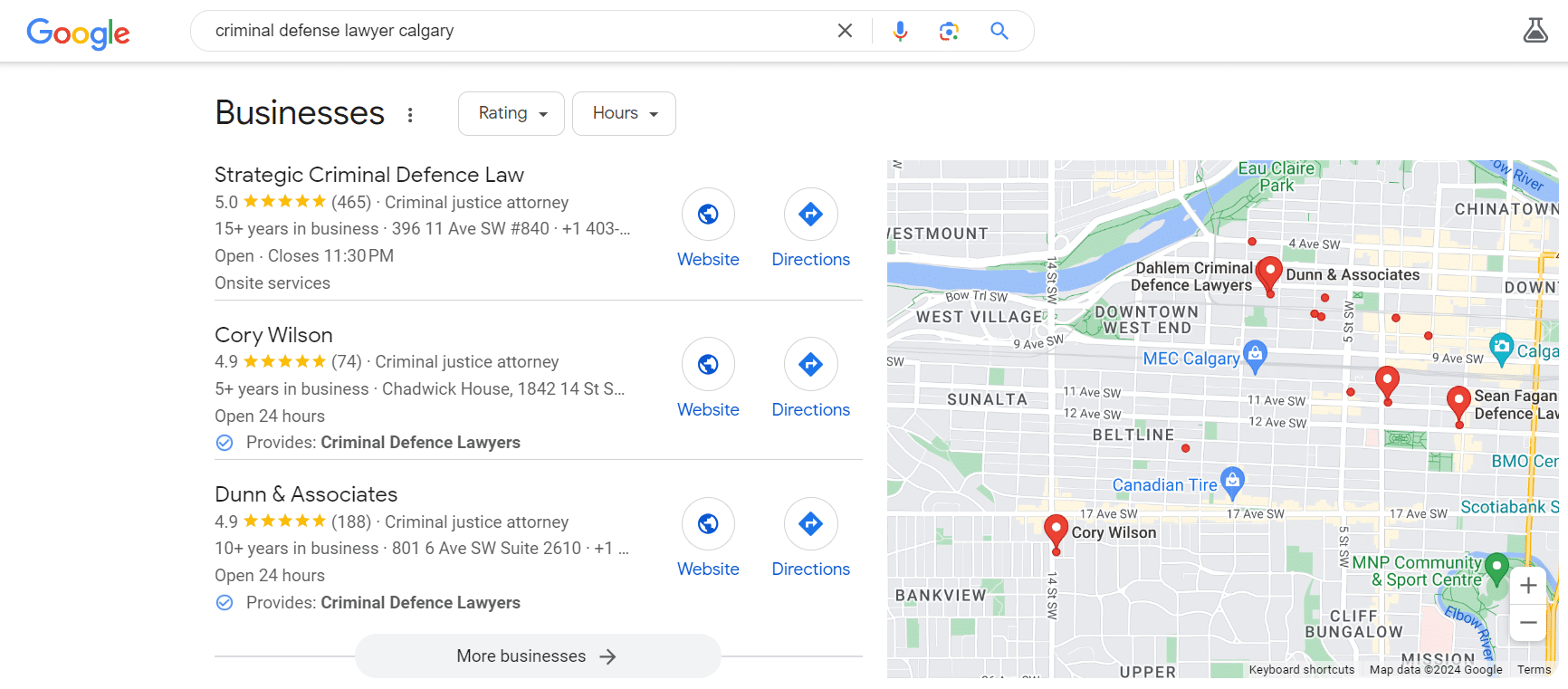
This is crucial real estate for any attorney looking to attract clients in a particular geographical area.
When featured in a Local Pack (also referred to as a Map Pack or 3-Pack), the businesses featured here receive the majority of the clicks on the page: around 44 percent of the total clicks (compared to 29 percent for organic results clicks).
Securing a spot among these three businesses can significantly increase local traffic to your firm’s website.
This highly visible and prominent listing is, basically, free law firm marketing that drives traffic to your website. And you can appear for any number of relevant local search results, giving you endless opportunities for high-quality leads.
Earning a position in the Local Pack is highly sought after. However, it requires excelling in local SEO beyond competing law firms and optimizing specifically for local search.
Before we start to help you master local SEO for law firms, we need to understand the factors that determine how Google selects businesses to feature in the Local Pack.
The official word from Google on local search rankings confirms three main factors.
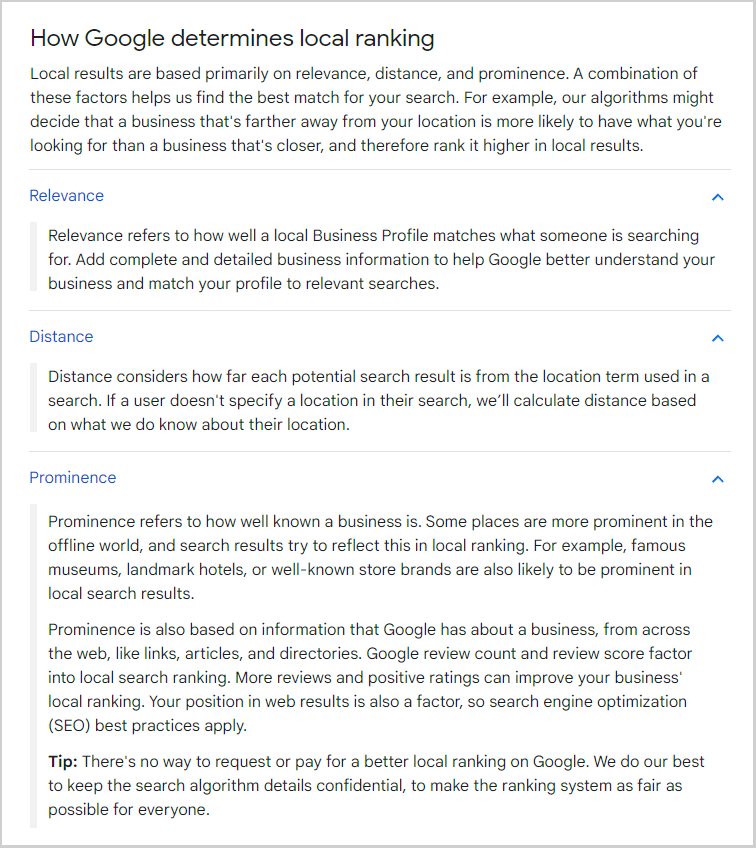
Google wants to match searchers with the best results. To do that, it wants to determine the most relevant information to the searcher.
If you own a criminal defense firm, make sure your GBP details that. A complete and detailed profile helps Google match your firm with qualified and relevant leads.
Aside from that, focus on:
Prominence refers to how well-known your business is. For example, a popular museum would rank higher than a little-known, run-down museum targeting the same keywords.
How do you improve your law firm’s prominence?
Google also considers your position in web results. So, a focus on improving law firm SEO across the board is recommended.
To summarize, the three main factors are:
These three factors are weighed heavily for the local pack. But there’s also organic local SEO, which is weighed differently.
BrightLocal surveyed local SEO experts to find out what the most important ranking factors are for both local pack and local organic SEO.
What this means is that the main ways to boost local search placements for lawyers are:
You can see that factors are weighted differently for the local pack versus local organic.
Local pack results are much more visible and have a higher conversion rate, so we recommend focusing on your Google Business Profile to start.
With that said, here are 10 strategies to improve your law firm’s local SEO rankings everywhere.
As you read these tips, consider what it means for your law firm to implement them.
Though the tips are for law firms specifically, your local environment and specialties will play a role in how you go about it.
With that being said, let’s dive right into the 10 local SEO tips.
As you now know, your Google Business Profile (GBP) is one of the more important factors for appearing in the Local Pack.
Here’s where it appears on the Google SERP.
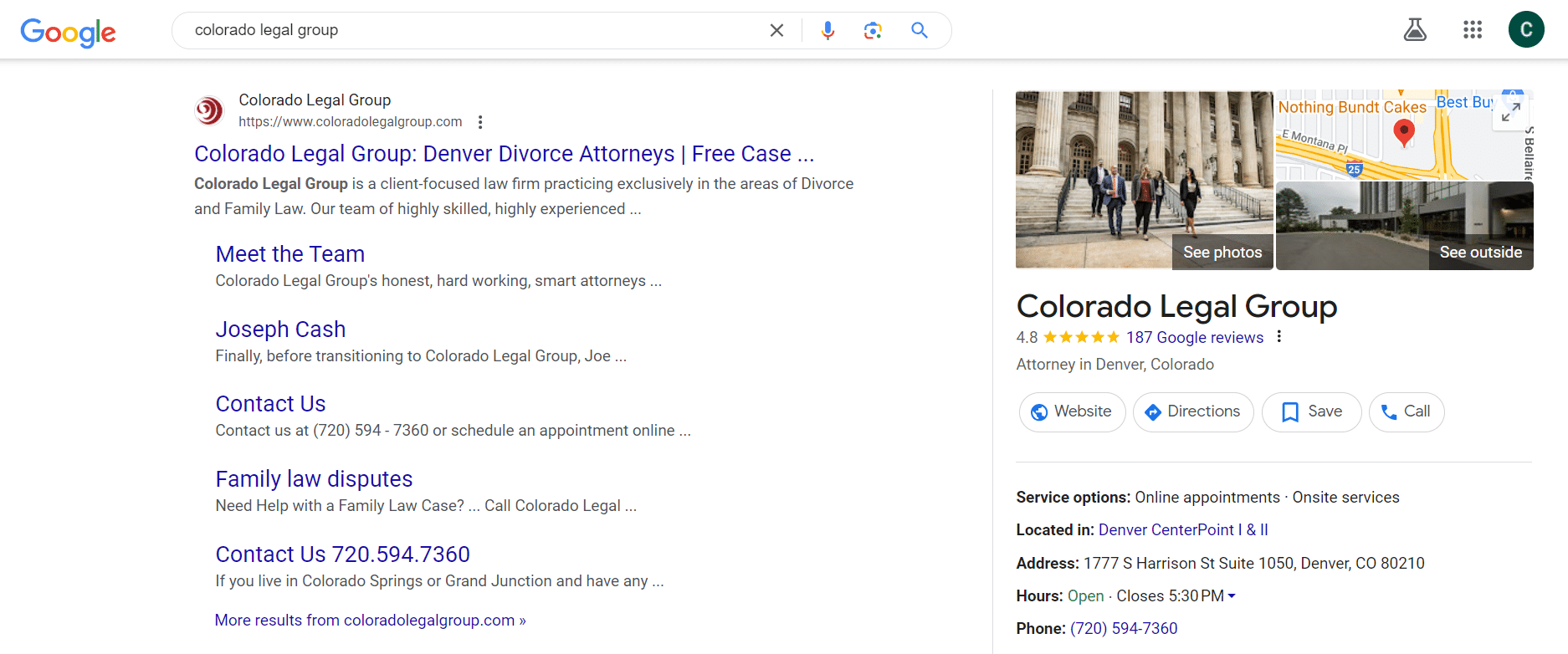
Google prefers to promote content that it can verify as accurate. GBP is the tool it uses to do that.
Put simply, GBP allows you to quickly and prominently share your business details, service offerings, and reputation with anyone searching for a local lawyer.
And it’s how you get featured in Google Maps and Google Search. Google pulls your information to match you with relevant local queries.
To optimize your profile to be as visible as possible, start with your business description. You have 750 characters, so carefully craft your description to generate trust.
Here’s an example.
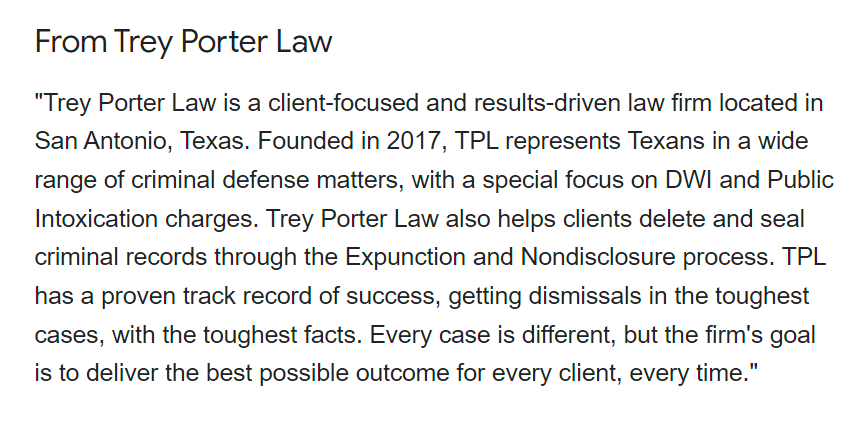
Include the basics, like:
And don’t forget keywords. We recommend you include just your main keyword in your GBP description, something like “Toronto Personal Injury Lawyer.”
But only once. Don’t overuse keywords, as Google (and searchers) will notice and potentially penalize you.
Next, you want to choose your category. This defines your business and doesn’t pertain to what you sell or your services.
For example, a criminal defense attorney would choose “Criminal Defense Attorney” as their category, plus additional categories like “Lawyer” or “Trial Attorney.”
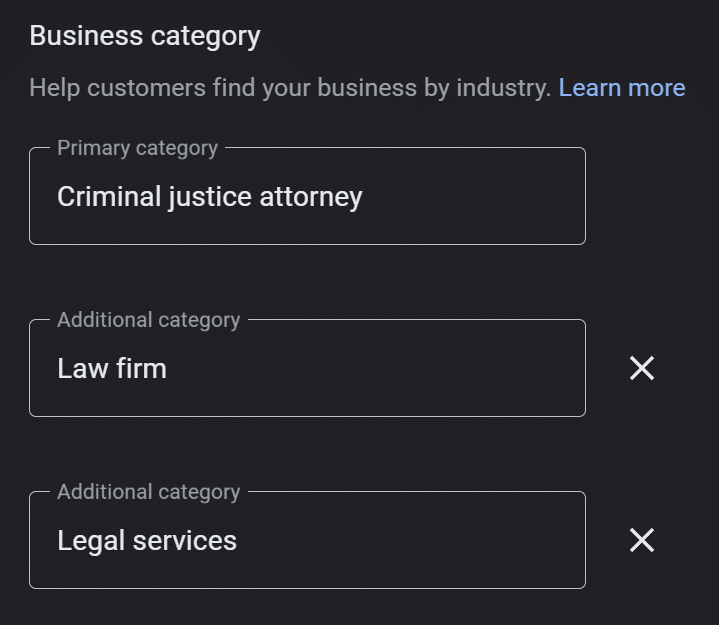
We’re visual creatures and are naturally drawn to photos, so add some that represent your law firm.
Some photos you may want to upload are:
Next, consider adding some posts.
It’s as easy as selecting “Add Update.” You’ll then be prompted to:
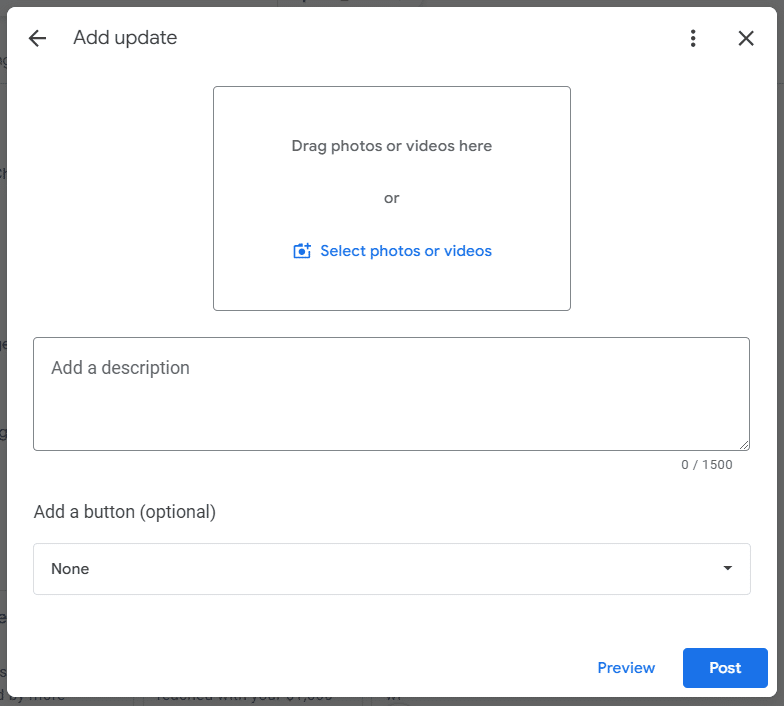
What do you post about? Our clients provide general information related to their practice areas to showcase their credibility and authority.
There are a few other things you can do to improve your rankings. Remember, local search for lawyers is about relevance, distance, and prominence.
Links are an important ranking factor for both local map and local organic ranking.
Aside from citation building, most law firms have active link-building campaigns to get backlinks from both local and non-local websites. The exact links you want to build to your law firm’s website depend on your practice area and where you’re located.
You can use a tool like Semrush to do a competitor analysis and analyze your competitor’s backlink profiles to find link-building opportunities.
Anchor text is an important part of backlink building. It provides search engines with context about the content of the link’s destination, helping them understand and rank the content accordingly.
Properly optimized anchor text can influence a page’s ranking for specific keywords.
And, by giving accurate context about the linked content, it offers clues to search engines about the relevance and subject of the linked page, aiding in the determination of its authority and relevance in search results.
There are a few types of anchor text to be aware of. You want to build backlinks with all types.
An Exact Match anchor would be something you’re trying to rank for, like “Toronto personal injury lawyer,” while a Partial Match anchor has some of the keywords, i.e., “personal injury lawyer john doe.”
The key is to have a variety of anchor texts pointing at your website. These links not only improve the rankings of the pages they point to but also of your entire website.
Social media becomes more and more relevant as the years go by — and Google knows it.
A healthy presence and regular content sharing on the most relevant social media platforms can help build awareness about your law firm’s brand while indirectly supporting your local SEO efforts.
We recommend Facebook and LinkedIn for lawyers, as they tend to have the most significant ROI.
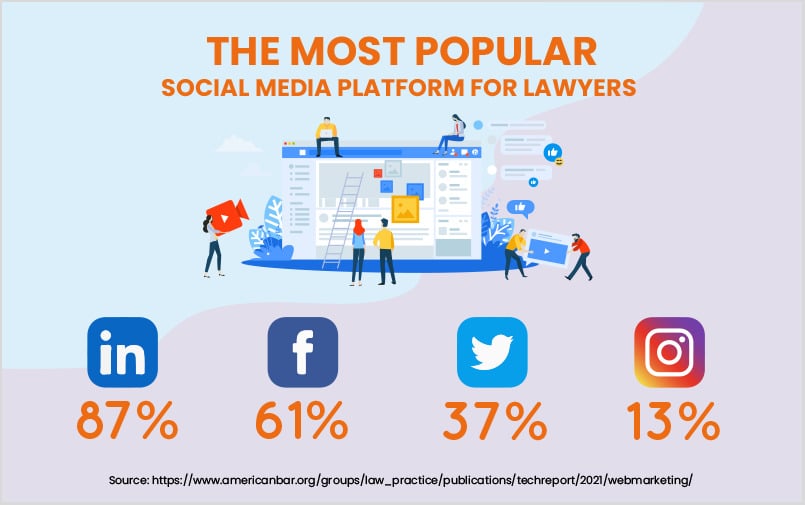
Did you know that your Google Business Profile also allows you to post content directly?
In fact, posting regular weekly legal content and updates about your law firm is best-practice local SEO for attorneys.
You can share anything you think is relevant to your target audience:
Here’s how our client Trey Porter Law addresses the problem of how to expunge a criminal record in Texas on his Google Business Profile.
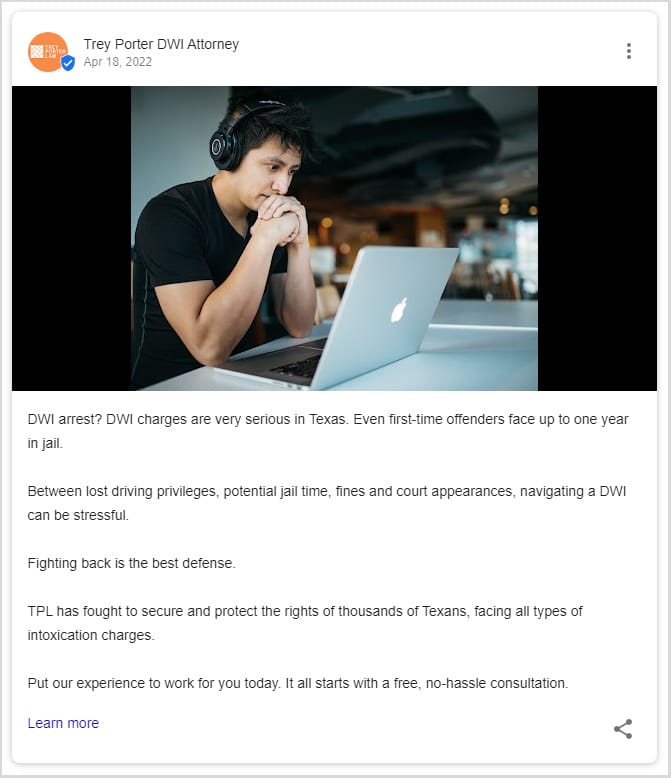
Aside from helping your target audience and promoting your firm, posting content like this regularly is a clear signal to Google that your business is relevant, authoritative and open for business.
Your content has a better chance of being pushed to the top if you’re active.
Plus, you can link back to your website’s blog posts or other landing pages directly from your Google Business Profile posts for additional SEO juice.
Curating positive law firm reviews from clients is a surefire way to increase your rankings. Without them, you won’t be able to compete with other local firms.
Strong reviews also serve as social proof. Any prospective client searching online for a law firm will check out the reviews. Having few reviews (or many negative ones) will damage your lead generation strategies.
Soliciting reviews from happy clients is one of the key ways we helped DWI lawyer Trey Porter start to dominate Google.

But how do you get reviews?
Like most of the best digital marketing strategies, many positive things happen organically if you provide a client-centered experience. But you sometimes need to give review-gathering a little “push.”
Many clients aren’t aware of how critical reviews are for businesses these days — or how to leave one.
Legal services rank among the highest regarding the importance of online reviews for potential clients to check, with 94 percent of people classifying reviews as important for financial and legal services in a recent Bright Local study.
It’s best to make soliciting a review from happy clients a part of the process as you close each case file.
This needn’t be burdensome. If you don’t like asking for reviews in person, you can automate it through email.
Here’s a sample email showing how you could approach a client.
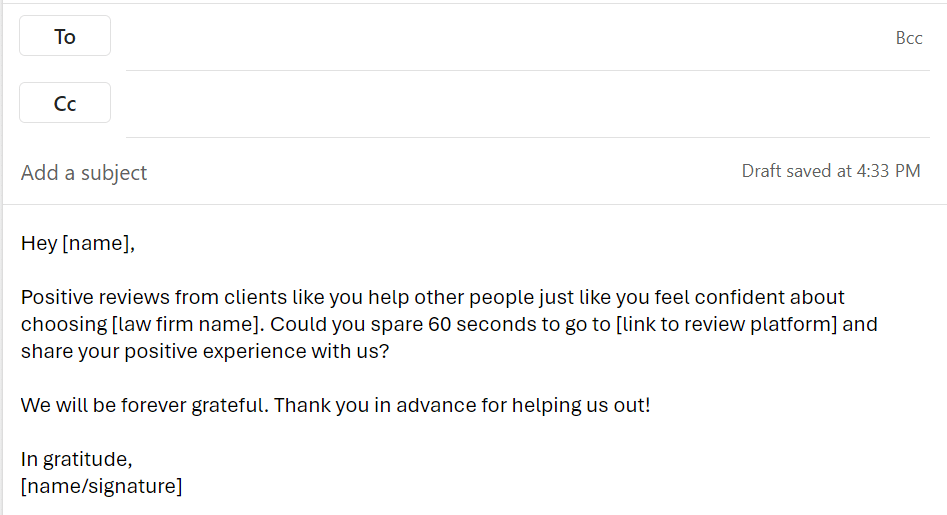
Many satisfied clients will happily leave a positive review when asked. In fact, 76 percent of people asked to leave a review do so, according to Bright Local.
Here’s some more interesting data they discovered.
Don’t forget to respond to all reviews, even negative ones. It shows you care about your clients. Sometimes, you can make it right, and a client may even change a review.
It also helps your local SEO efforts to show that you’re responsive.
While most people head to Google to search for lawyers, some browse directories like Yellow Pages or specific legal directories like Avvo. These pages are often placed high in the search results.
Your listings should be accurate and up-to-date across all directories. And consistency is key: Google loves listings that are consistent across the web and promotes them favorably.
Here’s an example of what your listing should look like on Avvo, one of the most popular legal directories.
Here’s a list of directories to consider listing your firm in:
A bonus of adding your law firm to these directories is that you can generate inbound links to your website, which will aid your general SEO.
A local citation is any online mention of a local business’s name, address, and phone number (NAP).
Citations appear online in many places, but the main spots are local business directories — and it’s easy to generate many citations to help your law firm boost its local rankings.
Avoid these mistakes when creating citations.
Keep all contact information up to date, including your address, phone number, website, and other relevant information. If Google can’t figure out which of your listings is accurate, it will penalize you.
Another key benefit of listing in the main legal directories is the backlinks to your website that it generates (more about backlinks below).

“My website continues to dominate all the top website searches in my industry and my business has grown 10-fold as a result.”
Oykhman Criminal Defence
Your website affects all your search engine optimization efforts. It’s an obvious place to look if you want to improve local SEO for lawyers.
Make sure you have a specific page with your location information to tell Google explicitly the localities in which you should rank (each of your locations).
It’s usually best to create location-specific pages for each office if you operate in different geographies. It will help get your firm in the local SERP for each area.
Oykhman Criminal Defense has created a different microsite for each of its offices — an excellent local search strategy for law firms.
Here’s another great example from one of Alberta’s leading employment law firms, which has optimized its website to rank in multiple locations in the province and beyond.
As the hub of your local search activities, it’s essential to keep your website’s on-page SEO up-to-date and optimized for search.
Here’s where to put your time and energy into the best results with on-page SEO.
Your meta titles and descriptions tell Google and searchers important information about your website’s pages.
Here’s what a homepage title and description might look like in the Google SERPs when optimized for local search.

Include your main keywords in different ways on different pages, and also pay attention to the following:
Here’s another good example.

Try to include your main and secondary keywords in all the main places on your website’s pages but make sure that it reads naturally and don’t overdo it. Write first and foremost for visitors and keep it informational.
As well as the meta titles and description, add keywords and variations of your keywords to:
Suitable variations of this main keyword might be:
Embedding Google maps on your website is also good practice for local SEO. Many firms include maps in the footer of every page and/or the Contact pages.
Simply go to Google Maps and locate your business. Then click on the “Share” button, and the pop-up will provide an option to “Embed a map.” Click on that and then “Copy HTML.”
Once you paste that code into your website’s code, you’ll see something like this.
Surveys show that roughly 63% of searches originate on mobile devices.
Think about it — when you look up a business on your phone, what do you look for?
It’s usually:
Mobile searchers are primed and ready to contact the businesses they’re searching for — and your law firm needs to be ready for these prospective clients with a mobile-first (or at least a mobile-friendly) approach.
Google’s PageSpeed Insights can help you take steps to ensure your website checks all the boxes — with feedback on how to improve your site.
Ideally, you should see a page like this when you type your URL in and hit enter.
Google prioritizes websites that are mobile-first, meaning they’re responsive and perform well on all devices. You’ll rank lower across the board if your website is designed solely for desktops.
So, if you don’t see a result like the above when you test your law firm’s URL, you need to take action to make your website more mobile-friendly — speak to your website developer.
Not every client will visit your website through local search results. Some will find you through high-ranking blog posts or other content.
A comprehensive content marketing strategy that develops relevant, valuable resources in your practice areas and incorporates location-specific keywords will help you feature prominently in local and non-local search results and get even more clients.
Here’s a good example from our client, The Maine Divorce Group.
The value of high-quality legal content is becoming more important, and it’s worth bearing this in mind as you develop your strategy:
Google has evolved to a point where you can focus on creating content for the user, not the search engine. You’ll still be rewarded with higher rankings.
Do local keyword research to identify high-performing keywords targeting your area.
Even if keywords like “child support in Maine” don’t convert directly into clients, they go a long way in generating backlinks and visits. This is good for SEO, in general.
Create a content plan that specifically addresses local topics in addition to your more SEO-centric posts. Luckily, there are a lot of things for lawyers to cover.
For example, you could be the local authority and publish content covering:
Here’s a good example of “local content” from New York family law firm Stephen Bilkis & Associates.
You can even use your insight to provide opinions on local crimes, changes in the law, or anything else you feel qualified to speak on. It won’t take long before you’re known as an authority in your area.
These are just a few options. Consider what kind of “top-of-funnel” (informative and problem-solving) content you can publish that’s relevant to your audience. Even go beyond your practice area if it’s relevant.
Don’t stop at sharing your thoughts and opinions on local happenings. Get out there and engage with your local community. The more you participate, the more digital PR you can get.
The benefits go beyond getting your name out there.
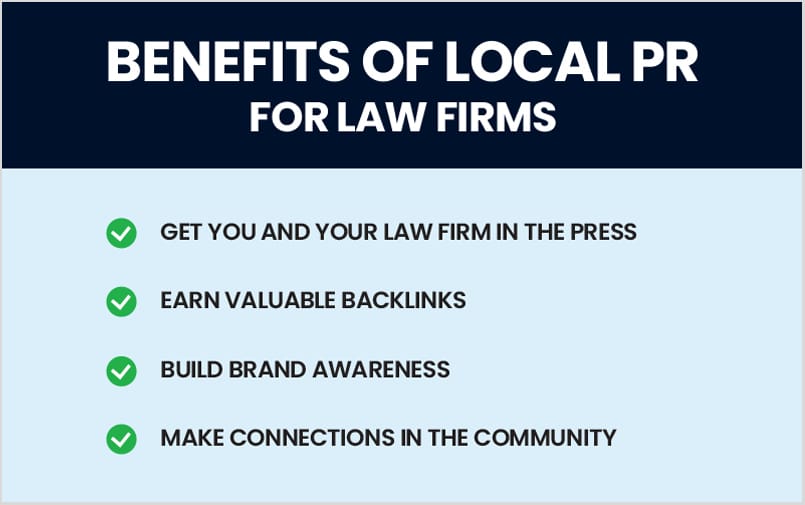
There’s a lot of value in participating in local events. And some of those benefits directly affect your SEO, namely building backlinks.
But what types of events should you be involved in?
Consider the following:
Backlinks from news organizations and schools are precious as they are considered high-authority links. Look to engage with these types of organizations whenever you can.
You can also actively generate backlinks from other local and non-local sites by engaging with your community.
Keep your link-building strategies and activities relevant to your local audience, and you’ll build valuable backlinks that will improve your local rankings (and make you feel good in the process).
We need to get a little technical with this one, but it’s actually quite simple. Some simple DIY steps are included below but if you prefer, get your web developers, SEO specialists or “website guy” to look after this one.
Local schema is a major ranking factor in local SEO for lawyers, but what is it exactly?
Well, Google needs to understand your firm’s web page data clearly to present it how you would like in Google Search. Local schema is a type of structured data markup code that helps you help Google.
By adding local schema markup to your firm’s website, you’ll optimize it for local search, making it easier for search engines to identify where you operate and what your firm does.
How do you do that?
The easiest way is to use Google‘s Structured Data Markup Helper.
Click on the blue button, and you’ll be taken to the Structured Data Markup Helper.
From there, follow these steps:
If you prefer, you can also use ChatGPT to create the schema for you.
We’ve covered the why and how of local SEO for lawyers.
Now, let’s look at a few tools you can use to improve your rankings if you go the DIY route.
Google prefers to promote businesses with consistent citations. So, it’s essential to monitor all mentions of your firm online and ensure the name, address, and phone number are up to date and consistent.
Whitespark helps with many elements of local search, offering local listing management and helping you build and update all local citations.
Aside from that, it recommends where you should list your business based on competitor data and even helps build reviews — all to improve your local search rankings.
Screaming Frog is not built for local SEO specifically but is the number one tool for technical SEO audits — specifically, its SEO spider tool.
Frogs? Spiders? It may seem like the only creature missing is snakes but all you need to know is that it’s a desktop program that crawls websites and looks for common SEO issues.
So, it can help improve your firm’s general SEO as well as local search results with:
You can crawl up to 500 URLs for free before upgrading to the paid version.
Moz Local is similar to Whitespark, improving online visibility by creating and managing your online local business listings on Google, Facebook, and so on.
Not only is Moz Local an excellent tool for keeping your listings consistent but it also collaborates with data aggregators to get your listings in front of more eyes.
Plus, there’s a built-in review manager. You can monitor and reply to reviews across all ecosystems from one dashboard.
One of the most widely used SEO tools (and for a good reason) is Semrush. It can help improve your local SEO by monitoring your backlinks.
There’s also a built-in listing management tool similar to Moz Local that you can use to distribute your business data to the top directories automatically.
Aside from that, you get a roster of SEO tools, including position tracking, an on-page SEO checker, competitor analysis, and more.
Local SEO for lawyers is neither difficult nor costly. Pay attention to the details, and it’s not that hard for a small local firm to outrank much larger businesses in the Google Map Pack and organic local search listings.
We can’t emphasize strongly enough the importance of a comprehensive local SEO strategy for any law firm looking to grow.
By following the above tips, you’ll attract new leads, establish yourself as an authority in your area, and increase revenues.
Ready to maximize your marketing budget? Fill out the contact form or call us today for a complimentary consultation. We will listen to your story, work to define your business objectives, and recommend an approach to deliver maximum ROI for your firm.
By using this website, you consent to our use of cookies in accordance with our Cookie Policy. Cookies help us enhance your browsing experience and provide personalized content. If you do not agree to our use of cookies, please adjust your browser settings accordingly.